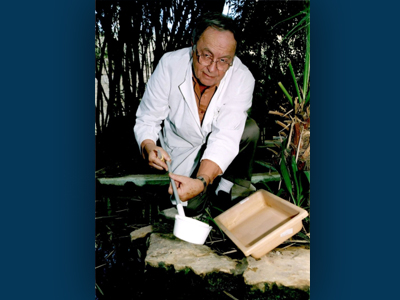April 2, 2011
Yoel Margalith was born in February 1933 in Cantavir, Yugoslavia (Today Serbia). In 1942, when the Nazis occupied Cantavir, Margalith and his family were deported first to Bergen-Belsen and then to Theresienstadt concentration camps. Surviving the Holocaust, Margalith immigrated to Israel with his mother and sister in 1948.
Settling in Jerusalem, he began his involvement with science and nature, first working at the Jerusalem Biological-Pedagogic Institute and the Biblical Zoo. He received both a Masters of Science and Ph.D. at Hebrew University, researching both the physiology of rat fleas and the biology of the tsetse fly. Following some time teaching in the United States, Margalith returned to Israel in the late seventies, where he began working as a professor and researcher at Ben Gurion University in Be’er Sheva, teaching as well as creating and directing the Center for Biological Control.
In 1976, Margalith discovered a naturally occurring bacterium that is lethal to most mosquitoes and black flies. The microbe Bacillus thuringiensis israelensis (Bti) released crystals which were toxic when ingested by the mosquito larvae. This natural pesticide controlled mosquito populations without harming the environment or other species.
Margalith was awarded the prestigious Tyler Prize for Environmental Achievement in 2003 because his discovery “saved millions of lives with minimal environmental impact.” He received numerous other honors and awards over the course of his distinguished career. Professor Margalith also used his scientific knowledge in the peace process, establishing multi-national research and work groups to control mosquitoes and flies between the Palestinian Authority, Jordan and Israel.
To see Professor Margalith’s page at the Tyler Prize website, click here: http://tylerprize.usc.edu/laureates/tyler2003.html#margalith.









